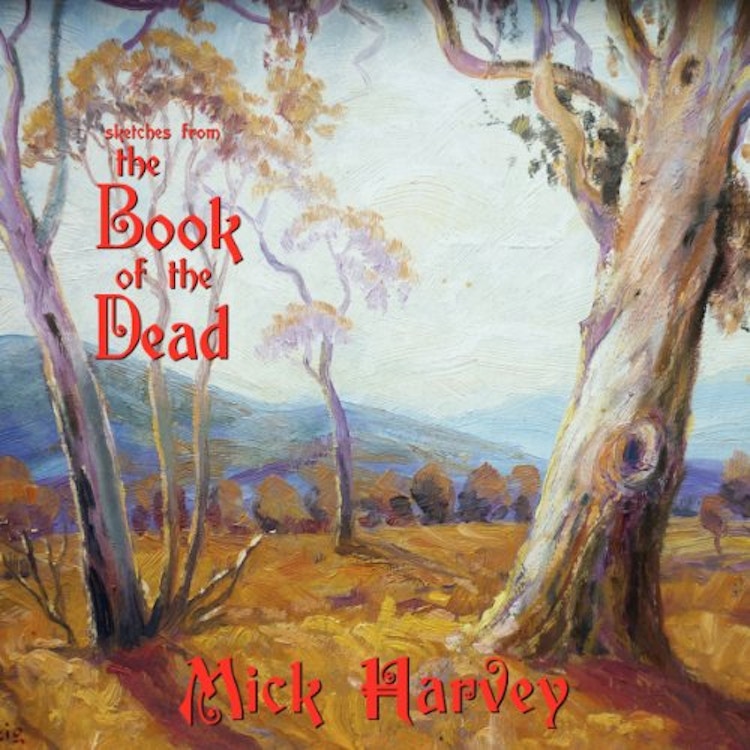"Sketches from the Book of the Dead"

By all rights, Mick Harvey‘s first album since leaving the Bad Seeds deserves to be a big deal. This is, after all, the man responsible for the juddering mechanics that cushions ‘The Mercy Seat’ and the clanging midnight movie nightmare of ‘Red Right Hand’: the beds on which Nick Cave’s most twisted rhymes restlessly writhe. Yet, Mick Harvey remains a relatively minor name, content to stay in the background, be it filling in for the briefly-reformed Triffids, or his higher profile work on PJ Harvey’s indescribably great Let England Shake – that’s his voice booming over the ethereal autoharps on its closing track.
Sketches from the Book of the Dead – Harvey’s first entirely self-penned effort – doesn’t look set to change all that. It’s a low-key record, tackling a high profile subject: death, with every track dealing with Harvey’s personal experiences, mourning friends and family by name. Sometimes, the subjects are easy to spot; over spikily-strummed guitars, opener ‘October Boy’, depicts a lonesome soul who “loved the Shangri-Las” but “took rock ‘n’ roll poison bought into that myth” – a tribute to his former Birthday Party cohort Rowland S. Howard, for whom Harvey also produced two stunning solo albums, that’s equally heartfelt and disappointed.
Harvey’s direct production style – sparse, dusty and frequently drum-free – draws attention to the lyrics, a collection of outback eulogies and austere Australiana, which are frequently astonishing; his attention to detail on ‘A Place Called Passion’ (which, like PJ’s latest record, take World War I as its setting) is astonishing, while the random snatches of nursery rhymes that make up ‘Rhymeless’ are explained away by its devastating payoff, “all the songs that you never sang to your little ones.” Sadly, though, the emphasis on the lyrics seem to have distracted Harvey from paying as much attention as usual to their musical backing; Sketches is certainly a consistent LP, but that’s as much down to the meandering nature of its tunes as its wonderful words. Likewise, Harvey’s vocal delivery seems oddly blank throughout the album – perhaps owing to the closure this material might be giving him – yet you can’t help craving the kind of drama you get from his peers – Robert Forster, say, or N*ck C*ve.
Having said that, Harvey seems to have carelessly tucked the record’s real gems away near the end. ‘How Would I Leave You?’ sounds like an outtake from No More Shall We Part, cheekily kept for himself – a slowly-building piano ballad laced with harmonium and delicately tapped drums. Through its gorgeous lyrics, Harvey desperately works through the seasons (“With the heater on, and your woolly clothes/What if I leave you in the winter?”) trying to decide when he could depart, but he cleverly leaves it to the listener to realise that there’s never a good time for something bad to happen. ‘The Bells Never Rang’ sounds oddly reminiscent of a Document-era R.E.M. demo, all minor-key acoustics, gently cooed harmonies and quietly throbbing drums, as Harvey pays his own respects to a friend whose final wish – “no ‘Agnus Dei’ to the evening moon, ’cause you didn’t want them to” – was simply to be remembered in peace. Meanwhile, the album’s only uptempo number ‘Famous Last Words’ closes the record out in much the same way as ‘Death Is Not the End’ on Murder Ballads – an auditory wink to set the listener on their way. The track casts Harvey as a cynic on his death bed, asking his vistors to give him their famous last words for him, wryly reassuring them in return that it’s “too late for fruit too soon for flowers.” Ouch.
At fifty-two, it’s strange to think that only now has Mick Harvey decided to speak entirely for himself; so late in his career, it’s thrilling to think that there’s so much ground he’s capable of covering. Sketches from the Book of the Dead is a more coherent statement than its almost apologetic title suggests, but as the album ends, you’re left with the feeling the next time his name graces the front of a record cover, it’ll be less of a sketch and something closer to a masterpiece.
Get the Best Fit take on the week in music direct to your inbox every Friday

Tunde Adebimpe
Thee Black Boltz

Julien Baker & TORRES
Send A Prayer My Way

Bon Iver
SABLE, fABLE





